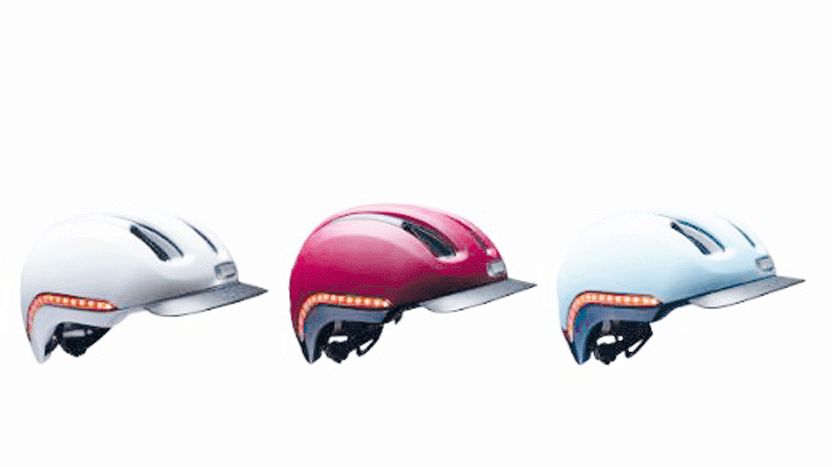Goa is abuzz with excitement as vintage bike and car owners, users, collectors and fans are decking […]

SAFETY PLUS HELMETS!
April 09- April 15 2022 April 8, 2022HELMET: Now that we have no choice but to wear a helmet or face a Rs 1,000 fine, those who are averse might as well buy the new multi featured helmet.
A range of new helmets have been developed which can monitor traffic signals and has lights which help to prevent access.
Forgot your bike lights? This 360-degree illuminated Nutcase helmet has you covered.
YOU KNOW, I can be a real dimwit sometimes. For too long, I’d dart around on short trips without bothering to slap a helmet on my head. It was a couple of close calls—both in the same evening—biking through New York City at dusk that caused me to wise up and start wearing a brain bucket every time I took out the bike.
Around the same time, I was griping about having to move headlights and taillights from one bike to another to another for ebike testing. Then the Nutcase Vio came along. It’s not the first helmet with integrated lights, but thanks to its wide distribution—from outdoor behemoth REI to small bike shops—it’s one of the most visible on the market.
Lights, More Lights, and Action
There are lights for seeing and lights for being seen. The former tend to be brighter, as you use them on dark roads, and the latter are more of an alert to other cyclists, pedestrians, and drivers to visually shout, “Hey, I’m over here! Don’t run me over!” The Vio’s forward-facing LED lamp casts 200 lumens, which puts it squarely in the “being seen” camp. That’s not to say it’s weak. Many handlebar-mounted headlights and integrated headlights (often found on ebikes) are less bright than the Vio.
If you’re riding on dark, unlit country roads or a racing bike at high speed, 200 lumens won’t be enough to light your way. But in the city and on an ebike typically going 20 miles per hour, I had absolutely no problem seeing where I was going with the Vio’s headlight—it performed better than I expected from 200 lumens. Even when I’d turn onto a deserted street and ride the dark stretches of road between streetlamps, it cast enough light for me to spot potholes in the dark.
There are red and orange 65-lumen LEDs spread around the back and sides of the helmet. That’s as bright as most stand-alone taillights, and it gives the Vio 360-degree coverage, so you can be seen from any angle.
There are three light modes that you set by quick-tapping the power button on the back of the helmet: on, flashing, and slow pulsing. When the lights are off, the Vio looks like a regular helmet. Unless someone were to inspect it very closely, it’d be hard to tell that it’s covered in LEDs.
Feeling So Seen
There are a few advantages to mounting the lights on the helmet rather than on your bike. For one, you’re more visible. Handlebar-mounted headlights and under-seat taillights are at roughly the same height as cars’ fenders, door handles, and trunks. A driver can’t see you if your lights are blocked by other cars.
With the Vio’s lights on top of my head, high above car fenders, I’d never felt more visible. Even pulling up next to a pickup truck at a red light, I knew the driver and the rest of traffic would see my lights, because they were higher than the windowsills and hood.
Headlights and taillights are also thief magnets. Whenever you lock up your bike to duck into a coffee shop or store, you need to remove your lights and carry them inside with you, in addition to your helmet and any bags you have.
I don’t like having to juggle all these things in my hands when all I want to do is drop off a package at UPS or buy a book. With the lights integrated into the Vio, I only have to bring the helmet with me, which I’d be carrying anyway. And I don’t have to fiddle with quick-release light mounts, which gets tedious after a while.
And no, MIPS is not some kind of medical ailment. It stands for Multidirectional Impact Protection System. There’s a semi-floating liner that slides around within the larger, outer shell. It’s designed to reduce rotational forces to the brain in the event of an impact.
Not every fall results in a straightforward blow to the helmet. In sports like cycling or skiing, a wreck usually means that a person hits their helmet against the pavement as they’re moving really fast. A sudden stop at speed would jostle the brain inside the skull. A MIPS helmet dissipates some of that force by rotating slightly, lessening the chance of a brain injury. Like all of Nutcase’s helmets, the Vio always comes with MIPS. I give Nutcase a thumbs up for including it.
The Little Things
Like most of Nutcase’s other helmets, the Vio is styled casually. It doesn’t have the Tour de France racing look, which I appreciate for a commuter-and-errand bike. My Vio came in matte black and, while it has vents for keeping cool on hot days, it looks the part for a cyclist who just wants to get from point A to point B.
The magnetic buckle on the chinstrap is a nice touch. It’s a cinch to pop the helmet off or put it on with gloved hands or even with just one hand, yet it feels secure and has never come off or loosened unintentionally. There’s also a removable visor that snaps onto the brim of the helmet to block the sun. I had my reservations as to its durability when I unboxed the Vio, but the visor has survived a few drops and is no worse for wear.
The integrated battery charges via an included micro-USB cable and runs for up to three hours on a charge. That’s not great, but it does the job for most errands and commuting, since you only need to turn the lights on in the dark.
At $150, it’s an expensive helmet, but buying a good helmet, a headlight, and a taillight adds up to more than that. Stand-alone headlights and taillights have their uses, but for city riding, having the lights mounted on the helmet makes more sense. Most importantly, you’re more visible to traffic, and you don’t have to fiddle with removing and carrying a bunch of lights when you park your bike. As long as you’re not riding on pitch-black country roads, it’s a no-brainer.
Courtesy: The Wired















